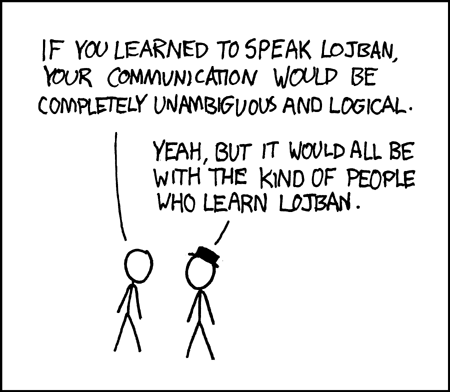English is burdened with a culture that emphasize empirialism, capitalism, individualism and so on. A culture that ignores climate catostraphy, global inequality and brings disproportionate attention to countries with english as national language. Additionally english is the language of Trump, Boris Johnson, Margareth Thatcher and George Bush jr… Protest the english language by embracing esperanto.
Break language segregation! Today, the world is segregated by language. It is very resource heavy to learn a new ethnic language.
Esperanto is like other constructed languages made to be easy to learn through consistent grammer, phonetics and morphemes. You know how to pronounce a sentence. You can determine the type of word by looking at the last letter. Even if you havent seen a particular word before, the chances are that you can predict its meaning if you know the morphemes. It is estimated that it requires a tenth in time investment to learn esperanto compares to ethnic languages.
The world language is political and it enables english imperialism.
Look up your local esperanto group. Learn it. Talk about it. With collegues, friends, acquantances and family. Engage your local community. Influence!
Some useful resources: Dictionary https://lernu.net/vortaro ActivityPub https://esperanto.masto.host Nice esperanto course: Kurso de Esperanto
Esperanto is still eurocentric. That is, it is only easy to learn because you already know English, and perhaps another European language. Lojban or toki pona would be a better option.
That is false. Esperanto is eurocentric. Thats true. But the reason it is so easy to learn is not because it is a merge of european languages. Rather it is because it is consistent and its many elements which by design makes the language easy to learn.
- All present tense words ends in -as, all subjectives ends with -o.
- The letters are always pronounced the same.
- The morpheme ‘mal’ is used a lot which creates the antonym of a word. Varma and malvarma means respectively warm and cold. Sana and malsana means respectively healthy and sick.
- Esperanto gives the speaker the -n suffix which is marking the direct object. In essence, this grants more flexibility to switch around on sentences to better fit how you want to speak the language.
In contrast, english is consistently inconsistent and thus makes it very hard to learn. The pronounciation changes depending on the words. The morphemes are inconsistent.
Lojban also has all these nice features, but better. It’s a newer, more sophisticated effort to do basically the same thing. It has some important good features that esperanto lacks.
There is a serious argument to make lojban the lingua-franca of the EU, to replace English. This would abort the erosion of the local languages. If the EU mandates that everybody learns lojban at school instead of english, it becomes a common second-language to everyone and a first language to no-one. Much more satisfactory situation.
I think it is great that you bring up lojban. This brings more nuance to the discussion.
I have not looked into lojban, could you describe some of the features you like that esperanto lacks?
I’ll look into it myself to get some impressions.
But that being said, constructed languages like these are very easy to learn. I don’t necessarily believe that we should only embrace a single conlang. Each language might have their own unique advantage over other constructed languages.
There is a serious argument to make lojban the lingua-franca of the EU, to replace English. This would abort the erosion of the local languages. If the EU mandates that everybody learns lojban at school instead of english, it becomes a common second-language to everyone and a first language to no-one. Much more satisfactory situation.
Could you give an article on this? Sounds potentially very interesting.
It’s a more modern attempt to do the same thing. I can skim wikipedia to find the main differences:
- It’s vocab was designed by computer to be familiar to speakers of all major languages (not just europeans).
- No diacritics.
- It doesn’t use prefixes and suffixes to indicate parts of the sentence. It uses word order.
But TBH it doesn’t matter which one is chosen. The important thing is to agree on one constructed language, and create a large international body of speakers - larger than the body of English speakers.
Later on, it will be easy to refine the language, or switch to a different one.
And here is an actual list from the lojban wiki:
Lojban:
- is designed to express complex logical constructs precisely.
- has no irregularities or ambiguities in spelling and grammar (although word derivation relies on arbitrary variant forms). This gives rise to high intelligibility for computer parsing.
- is designed to be as culturally neutral as possible.
- allows highly systematic learning and use, compared to most natural languages.
- possesses an intricate system of indicators which effectively communicate contextual attitude or emotions.
But TBH it doesn’t matter which one is chosen. The important thing is to agree on one constructed language, and create a large international body of speakers - larger than the body of English speakers.
I agree to some extent with this. I’ll elaborate further down.
You might already know this, but languages shape the way we think. This was shown in the book The Cambridge Handbook of Psycholinguistics, which you can read a summary of here.
With this in mind, I’ll tell you one reason I really like esperanto. It is designed around the idea of hope. Esperanto means ‘somebody who is hopeful’. We can see that words with positive conotations are elected as root words, which shapes the speaker to see the positives rather than negative. So you can easily hypothesize that the language makes you more optimistic and solution oriented. To make people see the possibility of change in the world.
I’m not sure how lojban is on this aspect.
Regardless, that is not to say that it determines it’s usefulness. A language designed primarily to be logical could be very useful in problem solving. It could be adopted in among others technology, mathematics and other fields to shape us into thinking more abstract and precise.
On the other hand I must say that considering that nobody has learnt lojban, this conversation feels quite hypothetical. There might be a possibility that it is hyped up, and I have no way of knowing that.
A language designed primarily to be logical could be very useful in problem solving
In a lot of things maybe. Communicating clearly is so difficult, especially about anything technical. I’d love to see how a lojban-speaking society handles its politics, bigotry, business, everything.
Do you ever walk into a huge argument and realise the whole problem is people’s different understanding of the meaning of a word? There is much more misunderstanding in the world than understanding. And natural language must be partly at fault.
But to get back to the point, having a logical lingua fraca for business and politics would solve a lot of problems. It would also help to preserve dying natural languages.
i agree that linguistic imperialism is a major issue, but we can’t solve it by swapping one imperial language out for another. instead of making everyone learn an auxiliary language, we should devote time and resources to reviving endangered languages and promoting awareness of indigenous languages. the English hegemony is a symptom of the linguistic imperialism problem, not the cause of it.
I guess it all comes down to that esperanto is a more inclusive language. It requires much less time investment to learn the language, so it could give people in the global south a lot more visibility and attention. And even more so if we can decentralize and distribute the web.
toki pona ftw!





